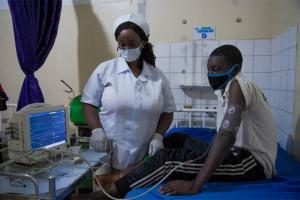Stakeholders advocate for advancement of nursing in diabetes care
Abuja, 16 November, 2020 - “I was diagnosed with type 2 diabetes seven years ago. It started with general body weakness. I was losing weight despite eating a lot of food, always drinking water and waking up to 6-7 times at night. The lack of sleep at night affected my work as I was summoned to my Supervisor’s office while caught sleeping during working hours. While discussing this incident with a colleague at work, she advised I seek medical attention immediately” stated Emmanuel Segun, a 53-year-old man.
“After explaining how I was feeling to the doctor, he asked me several questions including if anyone from my family has history of diabetes. After examining me, my glucose test showed a value of 13.5mg/dl. With the diagnosis of type 2 diabetes, I was referred for lifestyle modification counseling by the Nurse Educator and prescribed medicines.
Although Nigeria is yet to conduct a survey to obtain a nationally representative data on Non-Communicable Diseases (NCDs) including Diabetes, the 2018 World Health Organization (WHO) NCD profile estimates that four million Nigerians are diabetic. The frequency of diabetes is rising around the world, and studies are showing children are at increasing risk of developing the disease.
On 14 November every year, the World Diabetes Day is commemorated to raise awareness and attention to issues on diabetes and to keep diabetes firmly in the public and political spotlight. It is the world’s largest diabetes awareness campaign reaching a 1 billion people in more than 160 countries. The celebration of World Diabetes Day brings to mind a reason to acknowledge the increasing burden of NCD diseases globally with projected morbidity and mortality highest in Low and Middle Income Countries.
This year’s theme is “the Nurse and Diabetes” because nurses play key roles in providing lifelong care for people with diabetes, including screening, regular check-ups, psychological support and information on self-management and healthy living.
According to Professor Felicia Anumah, Dean Faculty of Clinical Sciences, University of Abuja and President of Diabetic Foot Nigeria Initiative, “Nurses are often the first and sometimes the only health professional in primary healthcare settings that a person living with diabetes interacts with and so the quality of their initial assessment, care and treatment is vital.”
She added that, “In Nigeria, nurses can play a very important role in supporting people living with diabetes from tackling risk factors to early diagnosis, self-management education and psychological support in order to prevent or reduce the chronic complications of diabetes. Nurses need to be empowered to serve as diabetes educators.”
Also, while commemorating the day, WHO Nigeria Country Representative Dr Walter Kazadi Mulombo mentioned that, “we can all take action to prevent diabetes by maintaining a healthy lifestyle, including avoiding sugary drinks, processed foods, tobacco and alcohol, and doing around three hours of physical activity every week, like walking, dancing or playing sport. Everyone should also be aware of early symptoms of diabetes (excessive urination and thirst, constant hunger, weight loss, vision changes and fatigue) and seek care promptly. I will continue to advocate to the government to recognize and advance the role of nurses in diabetes care in Nigeria.
Diabetes occur when a person is unable to produce enough insulin (type 1) or to use the insulin the pancreas produces (type 2), leading to high levels of blood sugar. Risk factors for diabetes include being overweight and physically inactive or having a family history of the disease. If left unmanaged, diabetes can result in serious complications including kidney failure, stroke, lower limb amputations, and blindness. In addition, for millions of low-income households, the costs of accessing lifelong care for diabetes and other NCDs can push families into poverty.
With the support of WHO, the Federal Ministry of Health in 2019 developed and launched the NCD Multisectoral Action Plan to serve as a framework for reducing morbidity and mortality of NCDs by instituting cost-effective policies and social interventions that will influence behaviours and lifestyle changes and reduce the modifiable risk factors for prioritized NCDs. These risk factors which are tobacco use, harmful use of alcohol, unhealthy diet and physical inactivity contribute to the four main NCDs namely; Cardio-Vascular Diseases (CVDs), Cancers, Chronic Obstructive Pulmonary Diseases (COPD) and Diabetes.
Another initiative is the pilot demonstration of the WHO Package of Essential NCDs in selected health facilities of the FCT. These are a set of evidence-based, cost-effective interventions aimed at strengthening the prevention and control of NCDs including Diabetes at the Primary Healthcare level.
Together we can beat diabetes.
Technical Contacts:
Dr Msyamboza, Kelias; Email: msyambozak [at] who.int; Tel: +234 906 278 4292
Dr Mary Dewan; Email: dewanm [at] who.int; Tel: +234 903 590 0750



